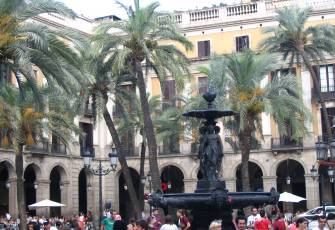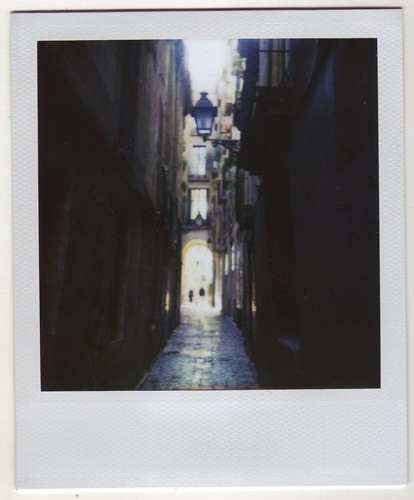I have to admit: Before I moved to Spain, I had no idea what a Catalan was, or that there was such a place called Catalunya. I thought Barcelona was in Spain, and Spain was a country of - Well, I'm American - I didn't know what it was made up of, but I thought everyone who lived here was
Español, and I never imagined it not being a unified nation. How wrong was I. I'd be interested in hearing if it's the same in Bilbao, Sevilla and Madrid, but at least living in Barcelona, I quickly learned that Catalunya was not Spain, but in fact it's own country, with its own language and culture, and that a small percentage here wouldn't mind returning to their independent status of yesteryear, because quiet frankly, many of the population don't care for the Spanish or Castellanos and the decisions made in Madrid.
Ignorant about its history and eager to learn more about my adopted land, I discovered through Wikipedia and conversations with my widowed neighbor Teresa that Catalunya was part of the Crown of Aragon, and it gained it's formal independence from France in 1258 with the Treaty of Corbeil; thus beginning the reign of Jaume (James) 1 and the expansion of the Kingdom of Aragon to include Valencia, Corsica and Sicily, and the promotion of Catalan language and culture throughout the territories. A series of kings and queens followed, stemming from marriages among European princes and princesses, and then King Martin 1 died in 1410 with no heirs, resulting in King Fernando I of Castillo receiving the crown after the Compromise of Caspe. Nearly sixty years later, the great Spanish empire was born after the marriage of Fernando II of Aragon and Isabel I of Castillo in 1469.
The presence of Castilian troops on Barcelona's streets two-hundred years later saw the Revolt of the Reapers in 1640. Local peasants (tired of housing the Spanish soldiers who fought against France during the Thirty Years War, and seeing their resources used for a war waged from Madrid) rebelled on Corpus Christi Day, chanting: "Long live the faith of Christ!", "Long live the king of Spain, our lord", "Long live the land, death to bad government." This led to the leader of the Generalitat Pau Claris declaring a Catalan Republic, and ended when his death created a power vacuum, resulting in the Treaty of the Pyrenees in 1659 and the loss of Northern Catalunya to France, with Southern Catalunya again under Spanish rule.
The death of Charles II of Spain in 1700 and the lack of a heir began the Spanish War of Succession with two European camps claiming the crown: The French Bourbons and the Austrian Hapsburgs. Sensing a chance for greater freedom from the centralized government of Madrid, the Catalans backed the Austrian contender for the throne; only to lose their special status as autonomous territories following the Fall of Barcelona on September 11 1714. Catalunya was once again a province of the Spanish Kingdom with Madrid as its capital; this time ruled by Philip V, grandson of Lois XIV of France.
The next two-hundred years witnessed Catalunya's rise as a major economic center of Spain and an industrial hub with the freedom to speak their language and celebrate their traditions dependent on the whims of whichever king sat on the throne in Madrid; and so it continued as the Great Spanish Empire slowly fell apart through a series of wars that resulted in loss of most of its territories, a period of Napoleonic rule, the return of the Bourbon king, and finally in the Second Spanish Republic that granted autonomy to Catalunya, along with the Basque Country and Galicia at the start of the twentieth century.
In 1931, Spain once again found itself a proxy for greater European powers with the Nationalist Forces of General Franco backed by the Germans and Italians and the mishmash of opposition forces consisting of Anarchists, Communists, and Republicans supported by Russia and Mexico; with Britain, France and the United States sitting it out. A three year bitter and brutal civil war ensued with brother killing brother, Catalan slaughtering Catalan, and son turning on father; and by the end, Barcelona found itself once again subjugated to the rule of Madrid with their language banned from all public institutions and mass media. It was during this time and based on a history of local princes controlled by European kings that Catalan Nationalism came to be with some of its leaders tortured under the dictatorship.
Today, nearly thirty-five years after the death of Franco, Catalunya is one of the 17 autonomous regions that comprise Spain, with its language taught in all schools and used throughout the local government and in many businesses. Yet, still the battles of the previous five hundred years are being fought; although, not through guns, but in political debates about how much control should be ceded to Madrid and in the constant promotion of the Catalan language at the expense of all others.

















